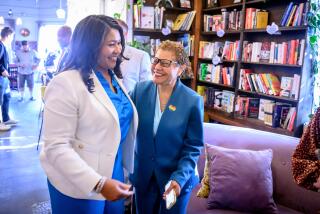Long Beach Mayor’s Race Has Surprises
The Long Beach mayor governs California’s fifth-largest city, and the job demands serving at least two starkly different communities.
One is the middle-class population that generally owns property, lives near the shore, university or country club--and is most likely to vote in Tuesday’s municipal election.
The other is the low-income population, which may be as high as half of the estimated 461,000 residents in a built-out city that, like much of the region, lacks affordable housing.
Primarily African American, Latino and Cambodian, this population lives primarily in the west or central neighborhoods and is least likely to vote.
But new plot twists have emerged in the election script of this city, which is home to a large gay population but is more conservative than West Hollywood.
* The union at the Police Department, which only a few years ago had its first gay officer come out, endorsed openly gay Vice Mayor Dan Baker for mayor.
* The write-in campaign for popular incumbent Beverly O’Neill, a former college president who termed out as mayor yet won endorsement by the Long Beach Press-Telegram and the formidable Greater Long Beach Chamber of Commerce, appears by some polls to be doing better than expected.
* For the first time, the city’s dozens of black churches and community groups are joining Cambodian refugees to get out the vote, and have endorsed Norm Ryan for mayor. Ryan, who also won endorsements from the Green Party and the Howard Jarvis Taxpayers Assn., has appealed to African American and Cambodian residents as an outsider who actually got something done--writing a proposition that reduced utility taxes.
“I’ve heard over and over again that ‘those people’ don’t vote,” Ryan said of the African American and Cambodian communities. “But angry people do vote. I’m hoping that will get many people to the polls.”
There are seven candidates for mayor, and numerous candidates for five of the nine City Council seats. The city prosecutor also is up for reelection.
But in a city the size of Portland, Ore., the centerpiece race is for mayor, a job that pays $90,000 but has no voting power beyond the veto.
The winner will be faced with trying to bridge all sides of Long Beach to ferry this port city into stable economic times.
Long Beach was among the American cities hardest hit by the last decade’s aerospace and military downsizing.
Most of the mayoral candidates have talked about the need to continue the city’s economic growth, but they quibble over how to go about it. Should the city drive even harder toward becoming a convention and tourist destination? Focus on neighborhood retail development? Stick with the delayed $700-million Queensway Bay waterfront project, or abandon it for a big park?
But various community groups have tried to focus the debate on the vexing problems of poverty, homelessness and a dire lack of housing.
Those are problems facing other cities, but they become magnified in such a big city, which is among the country’s most racially diverse. They are also issues of particular concern in the black community.
“Over the past several years, the African American voice in the city of Long Beach has been quelled,” said the Rev. Michael J. Ealey, who is leading the African American Unity Coalition seeking to offer one voice for black residents, churches and businesses.
The crowded field of mayoral candidates features O’Neill, whom supporters praise for boosting the city’s image nationally by working with Washington and business to promote the city’s attributes and international shipping port. She has served, they say, as an ambassador at a time when the city sorely needed one.
Although write-in campaigns are seldom successful, O’Neill’s mailers and success at getting the city to put pencils at polls make her shot stronger than would be typical, according to consultants on other campaign races.
In addition to Baker and Ryan, candidates for mayor include Councilman Ray Grabinski, police Cpl. John Stolpe, construction contractor David Wong and Bob Livingstone, a coach and teacher.
Grabinski, a resource coordinator for the University of California, is thought to have strong name recognition and has been on and off the City Council since the early 1980s.
Having served two consecutive terms, by law the city limit, his seat will be vacated. He has a populist speaking style, and opponents of the Queensway Bay waterfront development and expansion of a police substation at a park have voiced support for him.
Despite being a relative newcomer to city politics, Baker was early on the handicapped favorite, having raised the most money and won endorsements from influential forces, such as the police union and the Gay and Lesbian Victory Fund. He won benefits for gay city employees and has vowed, among other things, to address environmental issues including coke dust generated by the Port of Long Beach. Ryan serves on the public safety commission but has earned more ink for writing the successful city ballot Proposition J, which cut utility taxes.
More to Read
Sign up for Essential California
The most important California stories and recommendations in your inbox every morning.
You may occasionally receive promotional content from the Los Angeles Times.










